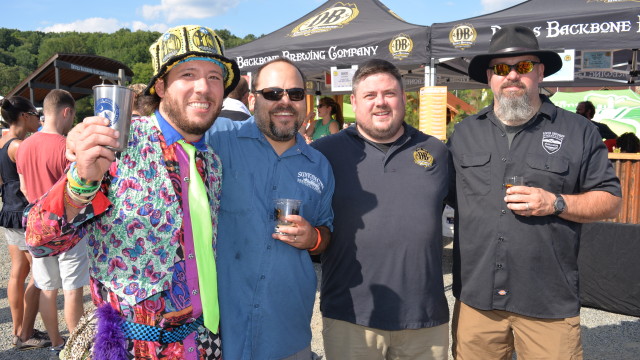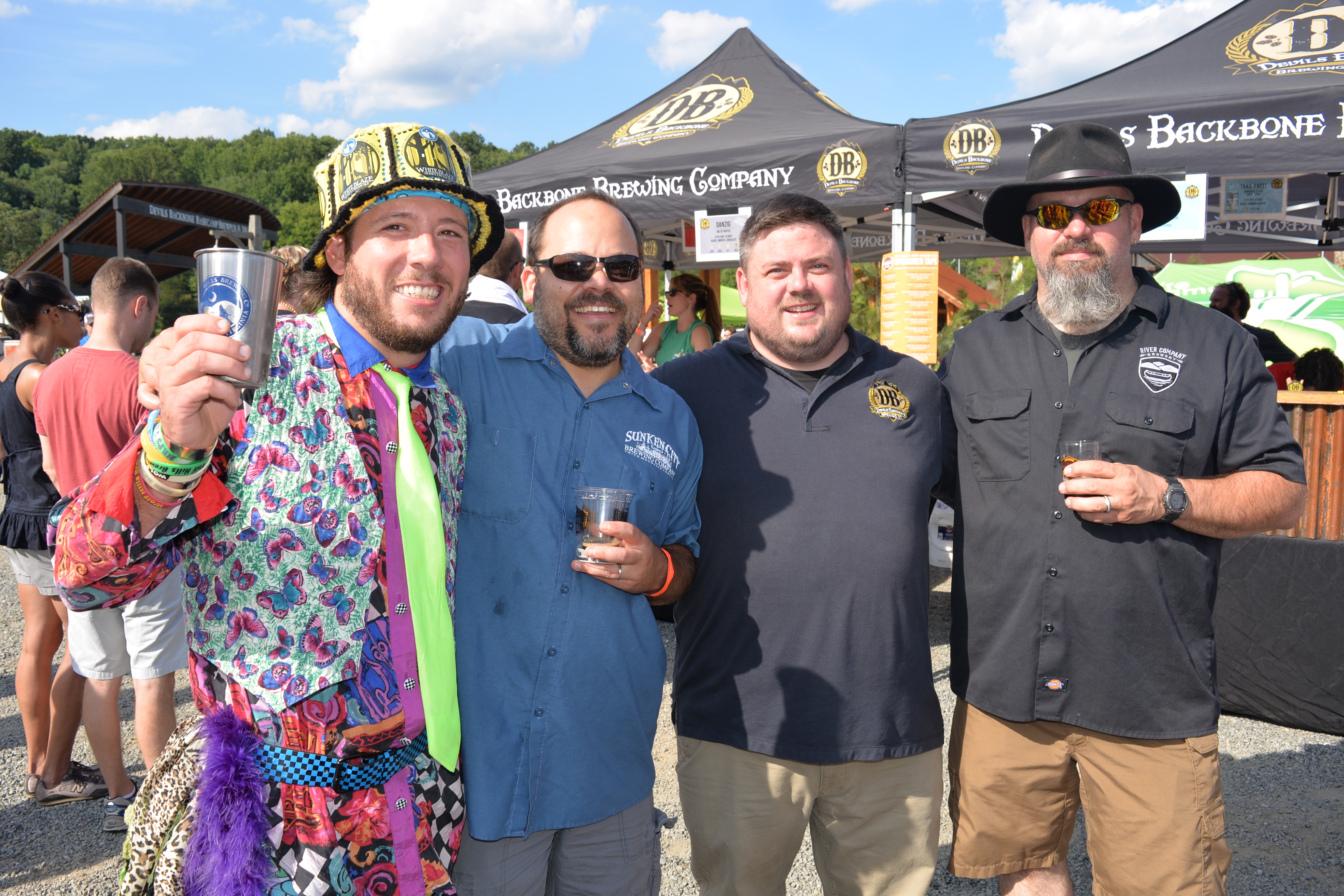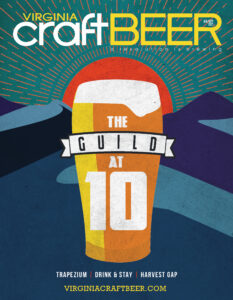
(Virginia’s craft brewers gather each August at Devils Backbone to compete for the Virginia Beer Cup)
By JEFF MAISEY
Virginia’s craft beer culture has rocketed into an exciting orbit since SB604 was passed.
At last year’s Virginia Craft Brewers Guild winter meeting Brett Vassey, president of the Guild and its parent organization, the Virginia Manufactures Association, announced the Commonwealth was home to 101 breweries. Now, in February, Vassey will celebrate the 142nd craft brewery.
I recently caught-up with Brett Vassey during a break at the Virginia General Assembly opening sessions to get his take on the current state of the industry. Here’s what he had to share.
What is the current state of the craft beer industry in Virginia?
It’s interesting that you mention that. We just produced an economic impact report and the current state is we’re at 142 breweries. Last year at this time (mid-January) we were at 101. The year before at the same time – 77. So it is an expediential growth each year.
We’re at about 8,900 jobs and about $1 billion in economic impact.
Does the economic impact calculation reflect things associated with craft brewery tourism such as hotel rooms, restaurant sales and the like?
No, that’s just the supply chain of the breweries themselves. Pretty exciting. Every year companies are getting more creative with their packaging, their beer. The quality keeps improving. The craft beer culture in Virginia has never been stronger.
What are some of the important initiatives being championed by the Virginia Craft Brewers Guild in 2016?
We have a couple of priorities. Our top priority is a bill dealing specifically with clarifying the taxation of brewing equipment. We’ve had a little controversy with the state department of taxation about the existing statute that exempts manufacturers from sales tax of their manufacturing equipment. Breweries are manufacturers.
The tax department and the Guild decided the best way to avoid controversy is to create a bright-line in the code clarifying that brewing equipment is indeed exempt. Our number one bill this session (of the General Assembly) is that bill.
The patron of that bill is the Vice Chairman of the House Appropriations Committee, Delegate Steve Landes from the Shenandoah Valley region. So we’re very privileged to have such a senior member of the House actually be the patron of the bill.
As you know State Bill 604 could be revisited at any time. Do you sense that it is in good shape and not likely to be augmented or overturned in the near future?
You know SB604, to be candid, requires constant vigilance. That section of the code really does require us to be very careful in working with our wholesale tier and our retail tier in Virginia’s three-tier system.
Being a good steward of that bill is something the Guild takes seriously.
Before we passed that statute in 2011 we only had 44 breweries. We’ve grown from 44 to 142 since the passage of that bill. So it really speaks volumes about how important that statute is to protect.
Right now there is no bill that directly would harm that statute, but I wouldn’t be honest if I didn’t say there is always that potential. We’re always working with legislators, the ABC and local governments in planning and zoning, and then, particularly, restaurants and wholesalers to ensure we’re all on the same page.
Speaking of the ABC, have the issues been resolved when it comes to uniform enforcement of the laws across Virginia?
Yeah, that’s one of our second priorities in this session – to get the full funding and support of a professional ABC. The ABC has spent the last two years doing a remarkable self-evaluation of their services, their business operations, of their outward-facing customer service. Travis Hill, their new COO, took on that responsibility. They have really reshaped the ABC in a fundamental way. They’re much more customer service focused.
One of the outcomes of that is that uniformity you talked about. We work almost monthly on collaborative ideas on regulations to ensure uniformity in application across the state. That’s everything from banquet licenses to inspections, and it really has been well-received by our members. They’re even doing roundtables with their regulated customers by region. Just having an open dialogue trying to understand how our breweries operate and the challenges.
The best evidence is for the very first time they now put all of their circular letters – guidance documents from the regulators themselves on interpreting either ABC administrate code or statute – on the state’s Town Hall, an online documentation management system that’s pushed out to the public. That’s a wholesale change in behavior.
Are there archaic laws that still need to be addressed by the Virginia ABC such as not allowing brewery brand signage to be visible on the exterior of restaurants?
Our Guild has not registered any concerns right now about retail advertising limitations or about swag. It’s amazing when we look at other states some of the biggest battles they fight are over some of the most meaningless issues.
We have focused on the fundamentals of making great beer and not getting sidetracked with issues like that. It has been to the advantage of the three-tier system in Virginia. I think, right now, if it ain’t broke don’t fix it.
What are your thoughts on breweries opening satellite locations around the state?
It seems to be one of the evolutions of this industry. The brewers that have products that are very popular or a business model that is popular where tourists and customers have a great experience, they’re having great success by opening other breweries around the state. It doesn’t seem to be letting up. That seems to be the new wave of innovation in the industry right now. Our multi-brewery sites from one brewer…we didn’t see that coming when we started the Guild or SB604.
One issue we talk about more than any other micro-trend in Virginia craft beer is the issue of satellite sites.
I liken craft brewery satellite locations to the time when sports brands such as Adidas and Nike started opening their own retail operations. In the case of craft breweries, they must produce a certain amount of beer – usually experimental, unique, on-location-only – at the satellite premise and then supplement with flagship beers supplied by the regional distributor. Does that sound about right?
I think what they’re doing is starting with a smaller unit and finding out what that particular region is responding to and then they scale-up production to meet that local demand. It’s very conservative, this model, whether they’re not making major capital investments and then they grow it based on the response from that region. Being small businesses they can’t afford to make mistakes. That seems to be the micro-rend we’re seeing all over the state. It’s just one more avenue of growth. More jobs. More craft beer.
How do you see the opening of Green Flash and Stone Brewing Company impacting the craft beer culture in Virginia as well as the Virginia Beer Cup competition held each summer at Devils Backbone?
At this year’s Craft Beer Cup we’re expecting to judge 400 beers. It’s growing at that rate.
We’re encouraging Stone to compete. It’s very interesting that their peers around the state are excited about their participation.
What I’ve observed is Stone, in particular, has made an extra effort to be connected to their peers in the Richmond market to be a presence that is encouraging, cooperative, not a lone soldier. That’s very much what defines the industry. Stone has really made a major investment in relationship building, probably because of the public relations challenges they had with all the controversy surrounding their incentive package with the city.
In Virginia Beach, Green Flash has not had those challenges because there have not been that many breweries in Virginia Beach. It’s growing, but not quite as large as the Richmond market. They haven’t had to spend as much time handling public relations. I do know that Green Flash is very community-minded and has done a great job working with their economic development community to make sure people know they’re a great corporate citizen.
Overall, I’m very proud of both companies coming from a California environment to the Commonwealth and trying to embed themselves with their peers and be part of our culture, not try to create a California beer culture (in Virginia). Every beer culture is a little different. We have some unique things as well. I think they’re adding to our beer culture, and that’s a good thing.



